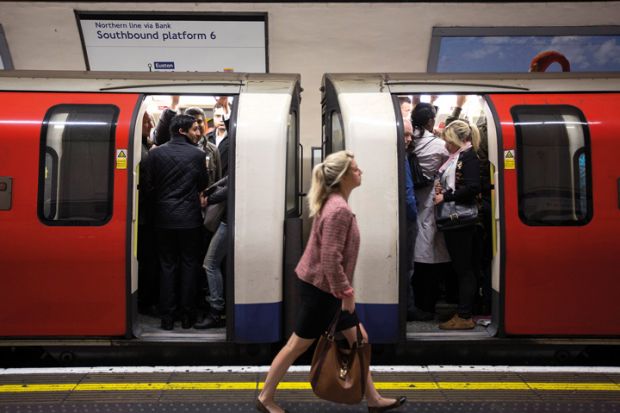Students who have long commutes to their university may be more likely to drop out of their degrees, a study has found.
Researchers who examined undergraduate travel time and progression rates at six London universities found that duration of commute was a significant predictor of continuation at three institutions, even after other factors such as subject choice and entry qualifications were taken into account.
The issue is a particular concern for universities in the UK’s capital because retention accounts for a quarter of the metrics in the teaching excellence framework, in which London institutions are regarded as having underperformed. This new study, published on 14 August, was commissioned by London Higher, which represents universities in the city.
At the six institutions in the study, many students had travel times of between 10 and 20 minutes, while many others travelled for between 40 and 90 minutes. Median travel times varied between 40 and 60 minutes.
At one university, every additional 10 minutes of commuting reduced the likelihood of progression beyond end-of-first-year assessments by 1.5 per cent. At another, the prospect of continuation declined by 0.63 per cent with each additional 10 minutes of travel.
At yet another institution, a one-minute increase in commute was associated with a 0.6 per cent reduction in the chances of a student’s continuing, although at this university it was only journeys of more than 55 minutes that were particularly problematic for younger students, and this might reflect the area these students were travelling from.
“Our findings suggest not only that students who commute in London may face barriers in their studies, but they may be less likely to pass their end of first year assessments, possibly also acting as an early signal in their prospects for retention and attainment,” the study says.
It adds that understanding “the effects commuting might have on student success may help [universities] to improve student continuation, which is important given its weight in TEF and which necessitates prompt identification for timely interventions to take place”.
The six universities that participated in the study were East London, Greenwich, Kingston, Middlesex, West London and SOAS University of London.
About half of all students at London higher education institutions are from the metropolis. In contrast to the quantitative data, a separate report by London Higher, also published on 14 August, found that students framed commuting positively, “valuing a separation between home and studying, and avoiding being distracted by peers”.
However, this study, led by consultant Liz Thomas and based on workshops with 38 students, also flags some of the challenges associated with commuter students: they tended to find travelling tiring and expensive, and it limited their ability to participate in group work, support activities and extracurricular events.
The report recommends that to better serve commuters universities consolidate students’ time on campus and try to limit the need to travel at peak times, when journeys are crowded and costlier. More widespread use of lecture capture and provision of 24-hour access to libraries and study spaces are also suggested.
London Higher says it will lobby the Department for Education on the need to take account of commuting time when comparing performance on continuation, and will also conduct research about the impact of commuting on staff, and any knock-on effects on students.




